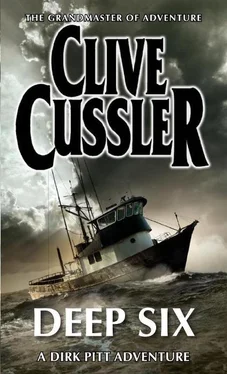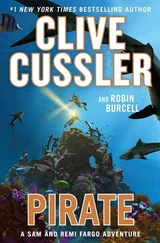In a motor home parked in the drive beside the old manor house, agent Blackowl sat scanning a row of television monitors. Another agent manned the communications equipment, while a third eye-balled a series of warning lights wired to an intricate system of alarms spaced around the yacht.
“You’d think the National Weather Service could give an accurate report ten miles from its forecast office,” Blackowl groused as he sipped his fourth coffee of the night. “They said ‘light mist.’ If this is light mist, I’d like to know what in hell they call fog so thick you can dish it with a spoon?”
The agent in charge of radio communications turned and lifted the earphones on his headset. “The chase boat says they can’t see beyond their bow. They request permission to come ashore and tie up.”
“Can’t say I blame them,” said Blackowl. “Tell them affirmative.” He stood and massaged the back of his neck. Then he patted the communications agent on the shoulder. “I’ll take over the radio. You get some sleep.”
“As advance agent, you should be bedded down yourself.”
“I’m not tired. Besides, I can’t see crap on the monitors anyway.”
The agent looked up at a large digital clock on the wall. “Zero one fifty hours. Ten minutes till the next post change.”
Blackowl nodded and slid into the vacated chair. He had no sooner settled the earphones on his head than a call came from the Coast Guard cutter anchored near the yacht.
“Control, this is River Watch.”
“This is Control,” Blackowl replied, recognizing the voice of the cutter’s commander.
“We’re experiencing a problem with our scanning equipment.”
“What kind of problem?”
“A high-energy signal on the same frequency as our radar is fouling reception.”
A look of concern crossed Blackowl’s face. “Could someone be jamming you?”
“I don’t think so. It looks like cross traffic. The signal comes and goes as if messages are being transmitted. I suspect that some neighborhood radio freak has plugged onto our frequency by accident.”
“Do you read any contacts?”
“Boat traffic this time of night is nil,” answered the commander. “The only blip we’ve seen on the oscilloscope in the last two hours was from a city sanitation tug pushing trash barges out to sea.”
“What time did it go by?”
“Didn’t. The blip merged with the riverbank a few hundred yards upstream. The tug’s skipper probably tied up to wait out the fog.”
“Okay, River Watch, keep me assessed of your radar problem.”
“Will do, Control. River Watch out.”
Blackowl sat back and mentally calculated the potential hazards. With river traffic at a standstill, there was little danger of another ship colliding with the Eagle. The Coast Guard cutter’s radar, though operating intermittently, was operating. And any assault from the river side was ruled out because the absence of visibility made it next to impossible to home in on the yacht. The fog, it seemed, was a blessing in disguise.
Blackowl glanced up at the clock. It read one minute before the post change. He quickly reread the security plan that listed the names of the agents, the areas they were scheduled to patrol and the times. He noted that agent Lyle Brock was due to stand post number seven, the yacht itself, while agent Karl Polaski was slated for post number six, which was the pier.
He pressed the transmit button and spoke into the tiny microphone attached to his headset. “Attention all stations. Time zero two hundred hours. Move to your next post. Repeat, move to the next post on your schedule.” Then he changed frequencies and uttered the code name of the shift leader. “Cutty Sark, this is Control.”
A veteran of fifteen years in the service, agent Ed McGrath answered almost immediately. “Cutty Sark here.”
“Tell posts numbers six and seven to keep a sharp watch on the river.”
“They won’t see much in this slop.”
“How bad is it around the dock area?”
“Let’s just say you should have issued us white canes with red tips.”
“Do the best you can,” Blackowl said.
A light blinked and Blackowl cut transmission to McGrath and answered the incoming call.
“Control.”
“This is River Watch, Control. Whoever is screwing up our radar signals seems to be transmitting continuously now.”
“You read nothing?” asked Blackowl.
“The geographic display on the oscilloscope is forty percent blanked out. Instead of blips we receive a large wedge shape.”
“Okay, River Watch, let me pass the word to the special agent in charge. Maybe he can track the interference and stop any further transmission.”
Before he apprised Oscar Lucas at the White House of the radar problem, Blackowl turned and gazed curiously at the television monitors. They reflected no discernible image, only vague shadows wavering in wraithlike undulation.
Agent Karl Polaski refixed the molded earplug of his Motorola HT-220 radio receiver and wiped the dampness from his Bismarck mustache. Forty minutes into his watch on the pier, he felt damp and downright miserable. He wiped the moisture from his face and thought it odd that it felt oily.
His eyes wandered to the overhead floodlights. They gave out a dim yellowish halo, but the edges had a prismatic effect and displayed the colors of the rainbow. From where he stood, about midpoint on the thirty-foot dock, the Eagle was completely hidden by the oppressive mist. Not even her deck or mast lights were visible.
Polaski walked over the weatherworn boards, occasionally stopping and listening. But all he heard was the gentle lapping of the water around the pilings and the soft hum of the yacht’s generators. He was only a few steps from the end of the pier when the Eagle finally materialized from the gray tentacles of the fog.
He called softly to agent Lyle Brock, who was manning post seven on board the boat. “Hey, Lyle. Can you hear me?”
A voice replied slightly above a whisper. “What do you want?”
“How about a cup of coffee from the galley?”
“The next post change is in twenty minutes. You can get a cup when you come on board and take my place.”
“I can’t wait twenty minutes,” Polaski protested mildly. “I’m already soaked to the bones.”
“Tough. You’ll have to suffer.”
Polaski knew that Brock couldn’t leave the deck under any circumstances, but he goaded the other agent good-naturedly. “Wait till you want a favor from me.”
“Speaking of favors, I forgot where I go from here.”
Polaski gave a quizzical look at the figure in the shadows on the Eagle’s deck. “Look at your diagram, numb brain.”
“It got soggy and I can’t read it.”
“Post eight is fifty yards down the bank.”
“Thanks.”
“If you want to know where post nine is it’ll cost you a cup of coffee,” Polaski said, grinning.
“Screw you. I remember that one.”
Later, during the next post change, the agents merely waved as they passed each other, two indistinct forms in the mist.
Ed McGrath could not recall having seen fog this thick. He sniffed the air, trying to identify the strange aroma that hung everywhere, and finally wrote it off as a common oily smell. Somewhere in the mist he heard a dog bark. He paused, cocking one ear. It was not the baying of a hound in chase or the frightened yelps of a mutt, but the sharp yap of a dog alert to an unfamiliar presence. Not too far away, judging by the volume. Seventy-five, maybe a hundred, yards beyond the security perimeter, McGrath estimated.
A potential assassin would have to be sick or brain damaged or both, he thought, to stumble blindly around a strange countryside in weather such as this. Already, McGrath had tripped and fallen down, walked into an unseen tree branch and scratched his cheek, found himself lost three times, and almost got himself shot when he accidentally walked onto a guard post before he could radio his approach.
Читать дальше












